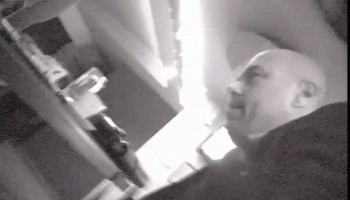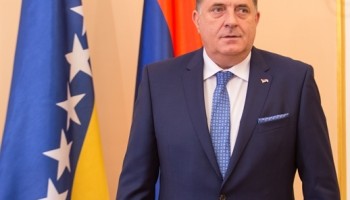Milan Tegeltija, the president of Bosnia’s High Judicial and Prosecutorial council (HJPC), which appoints and disciplines judges and prosecutors, has been the subject of much scrutiny over the past month, after a secretly-filmed video emerged showing a policeman allegedly taking a bribe on his behalf.
At a press conference on Friday Tegeltija claimed that some journalists and public officials may have breached legal limits in discussing his role in the scandal and asserted that he will seek legal repercussions against them.
“Legal action will be taken involving the filing of a civil suit for defamation against all media outlets and individual journalists, politicians and other people who made public statements or have cited false claims about me having committed any kind of corrupt act,” he stated.
He added that the legal complaints against these individuals would be filed abroad, including in Germany.
Tegeltija also added that he would sue Faris Vehabovic, a judge at the European Court of Human Rights, for saying Tegeltija should resign for moral reasons. Vehabovic told media on Friday he welcomes the idea to discuss the matter in court as that would be a good opportunity to tell colleagues of the state of affairs in Bosnia’s judiciary.
Bosnia’s Security Minister Dragan Mektic, who in the wake of the scandal called for protests against the judiciary, told media on Friday that he expects to be one of the people targeted by Tegeltija’s legal team.
“I expect all kinds of things from them, but I don’t expect anything intelligent,” he said, adding that he believes that Tegeltija has played a role in the corruption of the judiciary.
The eight minute video at the center of the scandal was filmed in November 2018, and shows an officer named Marko Pandza from the State Investigation and Protection Agency (SIPA) meeting in a cafe with Tegeltija and businessman Nermin Alesevic.
Pandza appears to act as an intermediary while the two are discussing Alesevic’s case, which has been slowly handled by the Canton Sarajevo’s Prosecutor's Office.
Tegeltija asks Alesevic for the case number and the name of the prosecutor handling it but does not directly ask for any money or favors from the businessman.
Yet when the three exit the cafe the video shows an exchange between Pandza and Alesevic, in which Alesevic counts out the equivalent of US $1,143.6 in Bosnian money and hands it to Pandza, who assures him he will give the money to Tegeltija.
“He will take care of it,” Pandza assures Alesevic.
Tegeltija has denied having any knowledge of the conversation the policeman and the businessman had after he left, and has claimed that the footage only proves his innocence.






